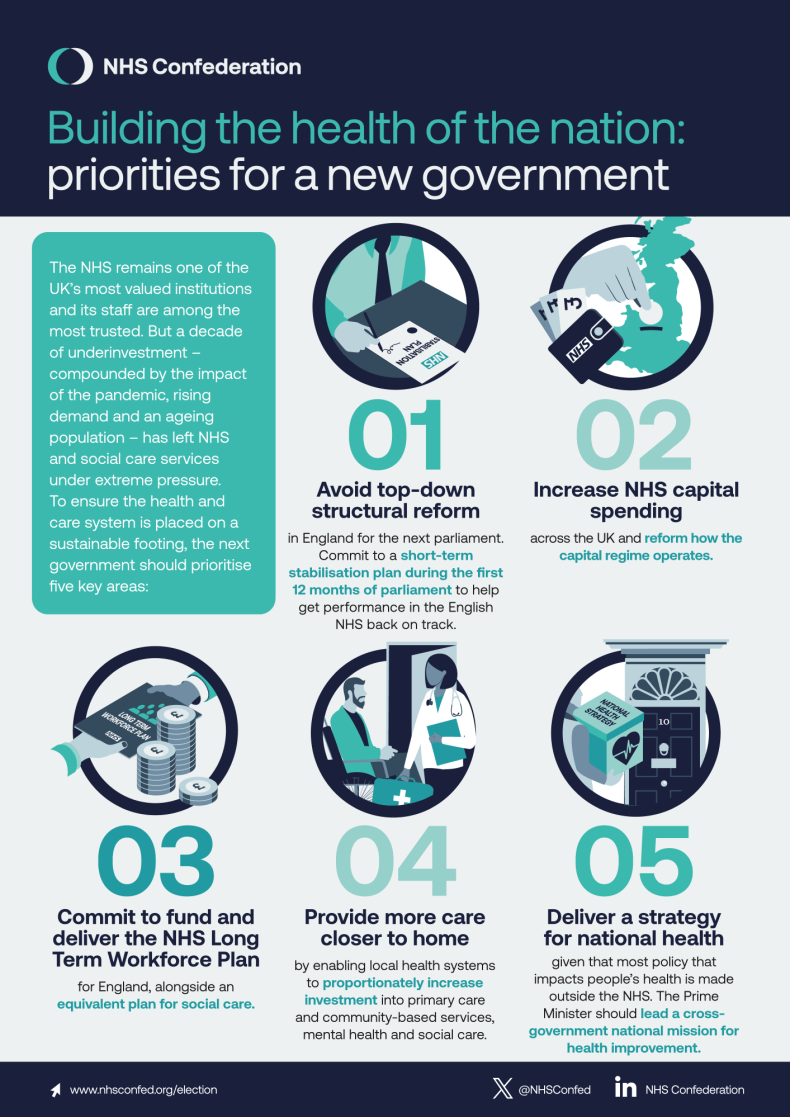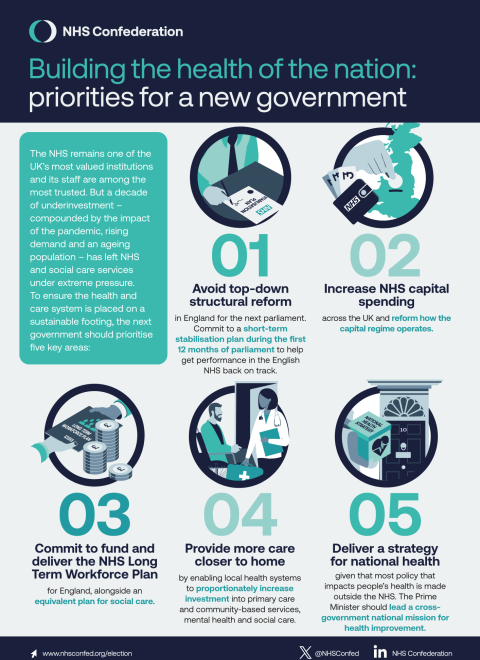
Introduction
The NHS remains one of the UK’s most valued institutions and its staff are among the most trusted. But a decade of underinvestment in the 2010s, compounded by the impact of an unprecedented pandemic, rising demand and an ageing population, has left NHS and social care services under extreme pressure.
This manifesto draws on the views of our members – health and care leaders across England, Wales and Northern Ireland – and sets out the changes that whoever is elected at the next election will need to make if the health and care system is to be placed on a sustainable footing.
A well-resourced NHS is vital to the running of the economy, including supporting people to work
Our starting point is that a well-resourced NHS is vital to the running of the economy, including supporting people to work. It should be regarded as a key driver of growth. Our analysis shows that for every £1 invested in the NHS, the economy gets £4 back in gross value added (GVA). The next government should target investment in the NHS and social care as an explicit tool of economic development and prosperity.
To build the health of the nation and a more prosperous UK, as well as creating a more sustainable NHS given constrained resources, health and care leaders are ready to work with partners and patients to make tough and explicit choices on how local services are configured, what care should be prioritised and how best to transform services.
With NHS and other departmental budgets likely to be squeezed further in 2025 and beyond, this will require health and care leaders to ensure every healthcare pound is spent as effectively as possible.
It will require a concerted effort across the NHS, wider public services and the government to tackle critical areas of care that are in danger of going backwards, particularly when it comes to the state of children and young people’s health and care services where there are increasing pressures.
Health and care leaders need the next government to move away from the short-termism that has impeded progress
But to do that they need the new government to provide them with the tools, support and investment they need and to move away from the short-termism that has impeded progress. In so doing, the new government should back health and care leaders to make hard decisions on how best to serve their local communities.
Health and care leaders are also ready to grasp the opportunities presented by biomedicine, artificial intelligence and other new technologies that have the potential to transform health and care, including through more personalisation and empowering people with long-term conditions to effectively manage their own care. They stand ready to do this while holding fast to the NHS principle that the public cares most about – equity – which lies at the heart of the health service.
Health and care leaders want to see the new government prioritise the following five areas:
- Put the NHS on a more sustainable footing, with no top-down structural reform in England for the next parliament. Commit to a short-term stabilisation plan during the first 12 months of parliament to help get performance in the English NHS back on track.
- Increase NHS capital spending across the UK and reform how the capital regime operates. Specifically in England, capital funding needs to increase to at least £14.1 billion annually, a £6.4 billion increase from the current level of £7.7 billion. This is vital if we are to increase productivity and reduce waiting lists.
- Commit to fund and deliver the NHS Long Term Workforce Plan for England, alongside an equivalent plan for social care.
- Provide more care closer to home by enabling local health systems to proportionately increase investment upstream into primary care and community-based services, mental health and social care.
- Deliver a strategy for national health given that most policy that impacts people’s health is made outside the NHS. The Prime Minister should lead a cross-government national mission for health improvement to shift the focus from simply treating illness to promoting health and wellbeing, reducing inequalities and tackling the wider determinants of health, and supporting the public to be active partners in their own health.

Priorities for the next government
The NHS faces well-documented challenges which are affecting the quality and breadth of services it can provide for patients. But there are also significant opportunities to reform, get performance back on track and improve productivity. Here we outline each of the five priority areas that health and care leaders want to see the new government focus on.
1. Put the NHS on a more sustainable footing
The new government will need to support health and care leaders to grip the short-term challenges facing the NHS, which include reducing waiting lists and meeting the constitutional standards, while also identifying the long-term changes that are required to place the NHS on a sustainable footing.
Fixing many health priorities requires strategic clarity and investment over multiple years
The first priority should be to avoid any structural reform and disruption during the next parliament. In England, health and care leaders are committed to the future of integrated care systems (ICSs), which understand the health and care needs of their local communities. There is also broad support for them across local government. In time and with the right support, ICSs will ensure people can access more joined-up care, that health outcomes across communities are improved and inequalities reduced, and that NHS organisations act as strong anchor institutions driving growth in local economies.
However, too frequently those in the wider health system must rely on short term, unpredictable funding streams. This provides less value to the taxpayer and hinders health and care leaders from making the long-term plans necessary to integrate care and reduce inequalities. Fixing many health priorities – from reducing waiting lists to implementing the workforce plan – requires strategic clarity and investment over multiple years.
Recommendations to the new government
- Commit to no top-down structural reorganisation for the next parliament – this would be an unhelpful distraction and would set the NHS back in its attempts to lower waiting times, improve access and reduce health inequalities and make progress in other key areas.
- Commit to a 12-month stabilisation plan in England that mobilises government focus and resources around recovering performance in the NHS, including in areas of high pressure such as urgent and emergency care, the elective backlog and other ‘less visible’ backlogs in primary, community and mental health services.
2. Deliver a step change on capital funding
Demand for healthcare has grown significantly across the UK and will accelerate as the population continues to get older, with more complex health conditions and higher expectations of a longer healthy life. For example, the latest census data (for 2021) shows the population of England and Wales has continued to age since 2011. The number of people aged 65 years and over increased from 9.2 million in 2011 to over 11 million in 2021. In England over the next 20 years, the number of people older than 85 will double to 2.6 million. And almost 9 in 10 of people over 85 in England (86 per cent) live with at least one long-term health condition.
The primary way health and care leaders can increase productivity is through extra capital investment
To keep up with this demand, the health and care system must be given the support and tools it needs to be more productive. The delivery of the NHS Long Term Workforce Plan in England also expects the NHS to increase its overall productivity by 1.5-2 per cent: this is almost double the recent historical average of 0.9 per cent over the last 25 years.
While health and care leaders are concerned about the prospects for revenue funding given the outcome of the Autumn Statement in November 2023, which will see the value of the NHS budget eroded due to the impact of high inflation, they believe the primary way in which they can increase productivity is through extra capital investment. This is particularly in areas such as digital, technology and AI. However, the UK NHS has received lower capital investment than other healthcare systems internationally and other industries domestically. More specifically, 9 in 10 NHS leaders in England say that underinvestment in capital is undermining their ability to tackle the elective backlog. This must be addressed.
Recommendations to the new government
- Increase NHS capital spending across the UK, but specifically in England this needs to increase to at least £14.1 billion annually at the next three-year Spending Review; a £6.4 billion increase from the current budget of £7.7 billion. This would have extra funding implications for the devolved countries of the UK through the so-called ‘Barnett consequentials’.
- Develop a new long-term capital strategy to help the NHS be as efficient and productive as possible, which includes reform of the convoluted and inefficient way in which the capital regime operates. This is more than just about fixing roofs – it is about investing in the entire NHS infrastructure, including its buildings, medical equipment, IT and digital tools.
3. Commit to fund and deliver the NHS Long Term Workforce Plan
The public knows that the jewel in the NHS’s crown is its workforce. Almost half (45 per cent) of respondents to Ipsos polling for the NHS Confederation say that increasing staff numbers should be the priority for improving the NHS – this was the most popular solution.
The new government must ensure it builds the health and care workforce for the future that can meet population need and respond to changing demographics, as set out in the NHS Long Term Workforce Plan for England. It is vital that the plan is delivered in full by whoever is elected next.
Social care needs the political attention and priority of the next government
Health and care leaders know the social care workforce faces even bigger challenges than we see in health and without an equivalent plan for social care, the full benefits of the NHS plan will not be realised. Social care needs the political attention and priority of the next government. Skills for Care, the strategic workforce development body for adult social care in England, is developing its own independent workforce strategy for the sector, covering projected need over the next 15 years. This plan is being developed in collaboration with a range of organisations and health and care leaders want to see it acknowledged by the new government, so the social care workforce has its own strategy that mirrors the NHS’s plan.
Recommendations to the new government
- Fully fund and implement the NHS Long Term Workforce Plan in England and commit to ongoing regular reviews, as NHS England has indicated it will do every two to three years.
- Develop a plan for the social care workforce to mirror this and ensure that local authorities receive additional funding to deliver it.
4. Provide more care closer to home
For most people, being treated at or as close to home as possible is what is best for their health and how they want to be cared for. It is also most efficient and cost-effective for the NHS. Political focus and resources must shift to ensuring more people can access care closer to home in their local community and at an earlier stage of illness, with more continuity of care, rather than be left waiting until their health needs require hospital treatment.
Health and care leaders want to see increasing investment upstream into primary care and community-based services, mental health and social care. The evidence is clear that investing in primary and community care results in lower demand in hospital and emergency care. Our analysis shows that while every £1 invested in the NHS results in the economy as a whole getting £4 back in gross value added (GVA). When you examine the NHS budget more specifically, the greatest economic returns come from investing in primary and community care. Here we see £14 added to the economy for every £1 invested.
Too often long-term changes are impeded by short term, unpredictable funding streams
To achieve a decisive shift upstream, a baseline of current investment in preventative care should be established from which progress can be measured and benchmarked.
Another key part of this shift to more community-based care is introducing longer-term funding cycles – aligned between the Department of Health and Social Care, the Department for Levelling Up, Housing and Communities and NHS England – which would empower ICS leaders in England to make the best possible use of their allocated funds, to plan ahead and to innovate. Too often the long-term changes they want to make are impeded by short term, unpredictable funding streams. It also means central government and its arm’s-length bodies reducing the number of central targets and the administrative burden on local systems, which can stifle innovation. In return, they stand ready to grasp the nettle and take the difficult decisions required, but they need the support, freedom and backing from government to do that.
This shift could in part be enabled by empowering the public to take more control of their own health and care by adopting a new social contract based on a more active partnership between the public and NHS. And through the NHS working effectively in partnership with industry.
NHS activity is distorted because of the preponderance of targets and monitoring
A particular focus will need to go towards accompanying any shift of resources upstream, with a rebalancing of where national targets are directed. NHS activity is distorted because of the preponderance of targets and monitoring which focus largely on the acute sector. There are many significant challenges in mental health, community and other parts of the health system beyond the acute sector, but these are not often reflected in the national targets. There needs to be a wider review and reduction of the overall burden of top-down targets facing the NHS, with a re-balancing between acute metrics and issues affecting mental health, community, primary care and prevention.
In particular, health and care leaders are very concerned about the state of children and young people’s mental health services where there are increasing pressures. We believe this needs to be a key area of focus and an example of where national targets and measures could be broadened. But this needs to be undertaken as part of an overall reduction in the number of targets and of the monitoring burden that local NHS organisations are subjected to.
We urge the new government to commit to bringing forward the new Mental Health Bill
Elsewhere in mental health, reforming the Mental Health Act is widely recognised as being crucial to helping to move more support into the community. Detentions under the current 40-year-old Act require expensive inpatient treatment, and detentions are increasing every year. There is cross-party support to reform the Act, which would help reduce the number of people detained, give people more opportunities to challenge decisions made about their care and remove having a learning disability or being autistic as grounds for detention. The review of the Act was completed five years ago, a draft Bill was published in 2022 and pre-legislative scrutiny has been completed. The bill is ready to go, and we urge whoever is elected next to commit to bringing forward the new Mental Health Bill.
The new government needs to commit to support primary care further
Also, our members want to see the next government bolster primary care and other services provided in the community. Despite a shortfall of over 4,200 full-time GPs in England, primary care delivered over 1.5 million appointments per day in October 2023, with nearly three-quarters of these delivered face to face. But this is not sustainable, and we know many people across the country struggle to access care in their local area, despite more evening and weekend appointments, as well as efforts to recruit a range of different professionals across primary care. The next government needs to commit to support primary care further, including an expansion of delivery of care at scale by securing the future of primary care networks (PCNs), building on the success of GP federations in many areas and a commitment to establishing primary care provider collaboratives.
Recommendations to the new government
- Introduce longer-term funding cycles aligned between the Department of Health and Social Care, the Department for Levelling Up, Housing and Communities and NHS England, to allow local health and care system leaders in England to make the best possible use of their allocated funds, to plan for the long term and to innovate. These funding cycles need to reflect the long-term changes in demand facing the NHS from an ageing population, with more and more people living with multiple long-term conditions.
- Develop a framework by which preventative investment across health and local government can be measured in a consistent and comparable way. This will allow implementation of the Hewitt recommendation to increase spend on prevention over the lifetime of parliament, including to resource new models of care and transformation, particularly out of hospital.
- Reduce the number of central targets and the administrative burden on local health and care services which often stifles innovation and can lead to the wrong priorities being focused on. Accompany this with a re-balancing between acute metrics and issues affecting mental health, community, primary care and prevention
5. Deliver a strategy for national health
The health of the nation is about much more than what it means for the NHS – critical though that is. The adage that health is wealth is highlighted by the record number of people out of work due to ill health (over 2.5 million) and the estimated cost of £43 billion a year to the UK economy as a result.
Only 20 per cent of our health is determined by healthcare, with the remaining 80 per cent affected by wider determinants. Therefore, improving health and responding to rising demand for NHS services needs a cross-government approach which goes far beyond just the NHS. As a result, health and care leaders want to see the government deliver a strategy for national health as well as cross-government strategies that improve health and wellbeing, reduce inequalities and tackle the wider determinants of health. This should be part of a national mission, led by the Prime Minister, to shift the focus from simply treating illness to promoting health and wellbeing.
Health and care leaders want to see institutions across our society resourced and empowered to support everyone’s health
Investing in health promotion, not just healthcare, is not only the right thing to do for patients and the public, but most cost-effective. This involves education, social security, housing, sports and digital policy alongside many other areas. Health and care leaders want to see institutions across our society – particularly education – resourced and empowered to support everyone’s health. This starts by enabling children and young people to grow into healthy, happy adults that can secure the future of the country.
This will need to be accompanied by government legislative action that addresses poor health outcomes and systemic inequalities related to obesity, smoking, alcohol and gambling. This requires the next government to adopt a coherent policy approach to alcohol, tobacco and foods that have too much fat, salt and sugar, with a focus on primary prevention.
Without such action, it will become increasingly difficult for the NHS to respond to rising demand, including from a higher number of older and sicker patients, especially in the context of constrained public finances. With limited scope for extra funding, the next government will need to work effectively across all its policies to try to reduce unnecessary demand on the NHS through a more effective public health strategy. This will require the rest of the public sector and all departments to be mobilised to ensure their spending and investment decisions contribute to wider improvements in health and wellbeing.
Recommendations to the new government
- The Prime Minister should lead a cross-government national mission for health improvement to shift the focus from simply treating illness to promoting health and wellbeing and supporting the public to be active partners in their own health.
- Set up a sub-cabinet committee responsible for this mission and introduce new criteria in the Treasury’s green book assessing the impact of spending decisions on the health of the nation. This will ensure that the physical and mental health implications of all government policy are undertaken as part of the broader impact assessment process.
- Increase spending on the public health grant in England to at least £900 million a year, given the 28 per cent real-terms cut per person since 2015/16. This restoration would require an additional £1 billion a year to reverse previous funding cuts. This funding goes to local authorities from the Department of Health and Social Care and funds important services focused on prevention, such as drug and alcohol services, smoking cessation and sexual health services.
Next steps
To build the health of the nation and a more prosperous UK, as well as creating a more sustainable NHS given constrained resources, health and care leaders are willing to make tough and explicit choices on how local services are configured, what care should be prioritised and how best to transform services.
It will also require a concerted effort across the NHS, wider public services and the government to tackle critical areas of care that are in danger of going backwards, particularly when it comes to the state of children and young people’s health and care services where there are increasing pressures.
The new government must back health and care leaders to make hard decisions on how best to serve their local communities
This will require health and care leaders to ensure every healthcare pound is spent as effectively as possible. To help them do that, they will need investment in areas such as capital funding to ensure they can increase productivity. They also need the next government to employ new ways of thinking about the NHS and its role in our society – using investment in the NHS and social care as an explicit tool of economic development, planning for the long term and making health-building everyone’s business. In empowering communities to build their own health, they will strengthen their local economies and build a more prosperous country for us all. Above all, the new government must back health and care leaders to make hard decisions on how best to serve their local communities and to treat the NHS as a key driver of growth and prosperity.



